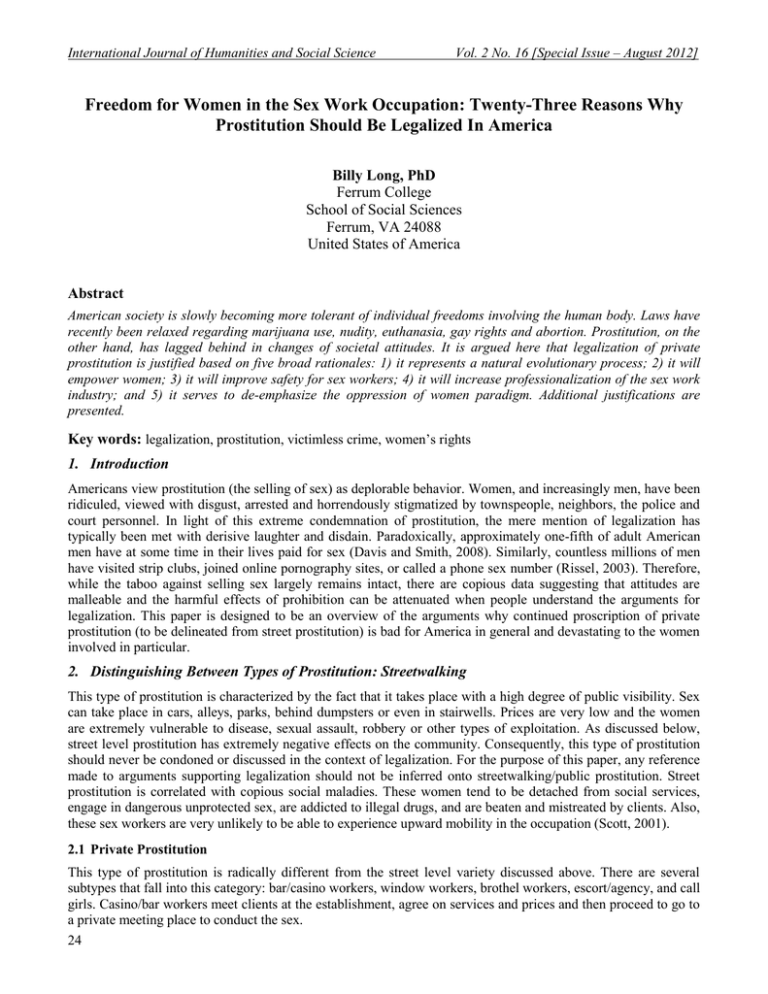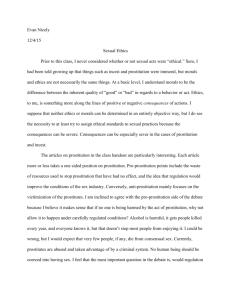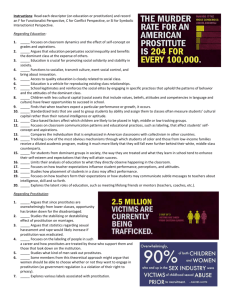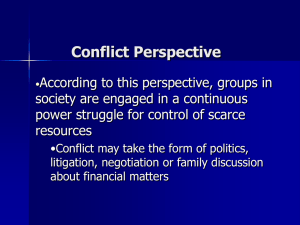
International Journal of Humanities and Social Science
Vol. 2 No. 16 [Special Issue – August 2012]
Freedom for Women in the Sex Work Occupation: Twenty-Three Reasons Why
Prostitution Should Be Legalized In America
Billy Long, PhD
Ferrum College
School of Social Sciences
Ferrum, VA 24088
United States of America
Abstract
American society is slowly becoming more tolerant of individual freedoms involving the human body. Laws have
recently been relaxed regarding marijuana use, nudity, euthanasia, gay rights and abortion. Prostitution, on the
other hand, has lagged behind in changes of societal attitudes. It is argued here that legalization of private
prostitution is justified based on five broad rationales: 1) it represents a natural evolutionary process; 2) it will
empower women; 3) it will improve safety for sex workers; 4) it will increase professionalization of the sex work
industry; and 5) it serves to de-emphasize the oppression of women paradigm. Additional justifications are
presented.
Key words: legalization, prostitution, victimless crime, women’s rights
1. Introduction
Americans view prostitution (the selling of sex) as deplorable behavior. Women, and increasingly men, have been
ridiculed, viewed with disgust, arrested and horrendously stigmatized by townspeople, neighbors, the police and
court personnel. In light of this extreme condemnation of prostitution, the mere mention of legalization has
typically been met with derisive laughter and disdain. Paradoxically, approximately one-fifth of adult American
men have at some time in their lives paid for sex (Davis and Smith, 2008). Similarly, countless millions of men
have visited strip clubs, joined online pornography sites, or called a phone sex number (Rissel, 2003). Therefore,
while the taboo against selling sex largely remains intact, there are copious data suggesting that attitudes are
malleable and the harmful effects of prohibition can be attenuated when people understand the arguments for
legalization. This paper is designed to be an overview of the arguments why continued proscription of private
prostitution (to be delineated from street prostitution) is bad for America in general and devastating to the women
involved in particular.
2. Distinguishing Between Types of Prostitution: Streetwalking
This type of prostitution is characterized by the fact that it takes place with a high degree of public visibility. Sex
can take place in cars, alleys, parks, behind dumpsters or even in stairwells. Prices are very low and the women
are extremely vulnerable to disease, sexual assault, robbery or other types of exploitation. As discussed below,
street level prostitution has extremely negative effects on the community. Consequently, this type of prostitution
should never be condoned or discussed in the context of legalization. For the purpose of this paper, any reference
made to arguments supporting legalization should not be inferred onto streetwalking/public prostitution. Street
prostitution is correlated with copious social maladies. These women tend to be detached from social services,
engage in dangerous unprotected sex, are addicted to illegal drugs, and are beaten and mistreated by clients. Also,
these sex workers are very unlikely to be able to experience upward mobility in the occupation (Scott, 2001).
2.1 Private Prostitution
This type of prostitution is radically different from the street level variety discussed above. There are several
subtypes that fall into this category: bar/casino workers, window workers, brothel workers, escort/agency, and call
girls. Casino/bar workers meet clients at the establishment, agree on services and prices and then proceed to go to
a private meeting place to conduct the sex.
24
The Special Issue on Commerce and Social Science
© Centre for Promoting Ideas, USA
www.ijhssnet.com
Window workers sit in display-type settings and allow men to examine them through glass from the sidewalk.
Once the man has made his selection he goes inside and makes arrangements to have sex with the girl via an
intermediary, usually a receptionist. Similarly, a brothel worker usually stays near a common area inside a large
house chatting with other girls and coworkers. A client enters and perhaps has a couple of drinks and is able to
chat with different girls. Once he finds one he likes he goes to a bedroom with her where the deal can be finalized.
This is designed to give the establishment plausible deniability if the girl is arrested by a police officer posing as a
client. Since the client only pays the receptionist for a “massage” there is no legitimate grounds for prostitution
charges against the brothel.
Escorts allow the receptionist to screen clients for her. A client calls the service, requests a specific kind of girl
based on age, race, hair color, and specialties (e.g., oral, anal, etc.). The receptionist sometimes checks to ensure
the client has not been blacklisted and in many cases can even perform a background check on the client before
arranging a meeting between the girl and the client. Escorts and call girls follow similar paths to clients either
through “out-call” (the girl goes to the preapproved address of the client or “in-call” where the client goes to the
girl’s place of residence).
The key here is that all of the private types of prostitution (call girls, escorts, brothel workers, window girls, and
bar/casino workers) provide a way to have gatekeepers protect girls from disease, attack, the weather, and hostile
elements via the screening of clients. These girls are much closer to support services such as medical care and
security as well. All of these girls have very low probability of exploitation by clients, very low public visibility
and their services have very minimal impact on the local community given the private nature of the interaction.
None of this is true of streetwalkers. As a result, it is conceptually justified to create a two category typology: 1)
private prostitutes and 2) streetwalkers. This two part typology provides the basis for arguing that the former
should be legalized while the latter should not (Symanski, 1981).
3. Arguments Favoring Legalization
Legalization and decriminalization are concepts that should not be used interchangeably. Decriminalization
basically removes sanctions from prostitution and generally leaves it unregulated. Legalization, on the other hand,
also removes punishment from prostitution but also introduces controls into the occupation such as licensing of
businesses, registering prostitutes, zoning issues so that the transactions are allowed only in designated areas,
compulsory medical exams, taxation, and regular inspections (Weitzer, 2012). Only arguments favoring
legalization are discussed here. Borrowing from Weitzer’s (2012) excellent tome on the topic, I have condensed
the arguments into five categories: 1) legalization represents a natural evolution toward tolerance for diversity; 2)
legalization will substantially empower women; 3) legalization will result in a much safer working environment
for female sex workers; 4) legalization will result in the professionalization of the occupation and its participants;
and 5) legalization will grant women freedom from patriarchal restrictions. Each of the individual arguments
within the five categories will be addressed below.
4. Arguments Related to Societal Evolution
4.1 Reason #1: Legalization Represents a Natural Trend Toward the Liberalization of Sexual Mores,
Norms and Values.
Recently in America there has been a general tendency away from artificial strictures that stifle freedom, mostly
as a result of adherence to religious superstitions. For example, attitudes are changing toward greater acceptance
of marijuana use, euthanasia, gambling, gay marriage, consumption of pornography and visiting strip clubs. While
attitudes towards private prostitution are slower to change, if more people are educated about the relative
advantages of private prostitution over the commonly cited streetwalking, then the resistance can be softened.
4.2 Reason #2: Legalization Will Represent an Evolution Away From the Hypocrisy of Allowing the Selling
of Sex Most of the Time While Selectively Criminalizing it in Other Situations.
At least 20% of adult males in the United States have paid for sex (Davis and Smith, 2008; Rissel, 2003).
However, this only includes direct cash payments for services rendered. What is not included in these data is how
many times men have implicitly negotiated sex in exchange for jewelry or other gifts such as heart-shaped boxes
of candy on Valentine’s Day in hopes of getting sex.
25
International Journal of Humanities and Social Science
Vol. 2 No. 16 [Special Issue – August 2012]
Along the same lines, how many women have received promotions in the workplace in exchange for sexual
favors and how much sex would take place in marriages if every time the mother of a child asks the father to
babysit for a couple of hours but the father continuously refuses this request? Why, then, should sex in exchange
for gifts or dinner and a movie be considered acceptable but when a man pays in cash he is stigmatized, arrested
and publicly humiliated? Legalization would put an end to this type of hypocrisy.
4.3 Reason #3: The American Public is Evolving in the Direction of Acceptance of Prostitution Anyway.
In 1977, 61% of Americans viewed prostitution as morally wrong. In 2006, however, this figure had plummeted
to 43% (Weitzer, 2008; Davis and Smith, 2008). Since this is the trajectory of public opinion, legislators who
want to be leaders should espouse pro-legalization views to be out in front of the issue and to expedite the
process.
4.4 Reason #4: Legalization Will Help Americans Evolve Into More Altruistic Beings.
By legalizing private prostitution, sex workers and clients alike can serve as role models for young people in how
to successfully challenge the current stifling sexual proscriptions. An altruistic objective that will be achieved is to
help reclusive, asexual men feel more connected to society given the increased availability of sexual outlets
(Sprinkle, 1999). Another altruistic outcome of legal prostitution will be to allow people the right to tailor their
sexual experiences to fit their needs, desires and fantasies. There undoubtedly are countless marriage partners who
have a relatively healthy relationship but who do not match completely on sexual appetites. One partner may, for
example, prefer aggressive anal intercourse while the other prefers to not be the passive partner in this scenario.
Similarly, one partner may want to engage in sexual role-play such as fantasies about daughter-father or sibling
incest whereas the other partner may find this objectionable. Legal prostitution would serve to allow the marriage
to remain intact while affording the partners the opportunity to satisfy these completely natural urges. Also,
partners would be able to match their desires to a sex worker based on age, race, and other physical features
thereby again serving an altruistic objective by tailoring the law to serve the public. Finally, by encouraging
tolerance for sexual expression, combined with the professionalization of prostitution, people will be able to
openly experiment and explore ways on how to become better lovers given that the atmosphere being created will
be one that is more accepting.
5.0 Arguments Based on Empowering Women
5.1 Reason #5: Legalization Will Help to Reconceptualize the Concept of “Demeaning Behavior Toward
Women.”
For too long, many in the United States have considered sex work to be demeaning toward women. Women sex
workers are typically viewed as “billiard balls” helplessly propelled into prostitution and being degraded by their
male customers. These hapless victims are viewed with pity while the evil male oppressor is castigated for
stooping to the depths of depravity by paying for sex with cash. This is a fallacious and wildly inaccurate
allegation. Quite the contrary, after legalization and normalization of private prostitution, more women will feel
empowered to perceive their activities not as degrading or demeaning but, rather, as uplifting and beneficial.
These women will find that they are tougher, quicker, smarter and more resilient than non-prostitutes and that
they are actually helping their clients. Once the irrational stigma of prostitution is lifted, sex workers will feel
liberated and empowered to begin realizing that they can have a dramatic impact on improving the self-esteem of
their clients (French, 1988). Similarly, once the prohibition era is over, female sex workers will begin to realize
that the money that changes hands is not a sign of demeaning exploitation at all but actually represents a sign of
weakness on the part of the male. After all, these are men who feel forced to purchase women’s attention. Money,
then, is not a sign of male oppressiveness but a weakness (Chapkis, 1997).
5.2 Reason #6: Legalization Will Reduce Women’s Need For Self-Esteem Crippling Welfare Programs.
Approximately 90% of all welfare recipients in the United States, particularly food stamps, are women. With the
legalization of private prostitution a potentially lucrative occupational avenue will be opened for women, one that
does not require high skill or education levels. While it is of course true that not all women on welfare would
immediately gravitate to prostitution, many probably would, and given that nearly 20% of all adult males in the
U.S. have at some point paid cash for sex, the possibilities for prostitution serving as an income redistribution
program are enormous.
26
The Special Issue on Commerce and Social Science
© Centre for Promoting Ideas, USA
www.ijhssnet.com
It is nearly certain that billions of dollars per year would be voluntarily redistributed from men to women and all
the while this would be taking place without the temptation of committing welfare fraud (e.g., EBT card fraud,
see Long and Hiltz, 2012) or having more children as a way of receiving more handouts. In fact, it would be in
women’s best economic empowerment interests to curtail the number of illegitimate children they have. Whereas
welfare encourages the production of illegitimate children, legal private prostitution serves as a deterrent because
children would get in the way of the sex worker’s occupation. So not only would women be more economically
empowered, society would greatly benefit given that available data show conclusively that children of women on
welfare are more likely to become delinquent or criminal (Donahue and Levitt, 2000). The simple fact of the
matter is that when a female sex worker sells sex, the money she receives becomes earned income. Welfare
handouts, on the other hand, represent “other people’s money.” It should be obvious that no one spends money as
responsibly as do the people who have earned it. Once money is pooled for later redistribution by government,
waste, fraud and abuse are certain to be rampant (Friedman, 1982; Long and Hiltz, 2012). This represents a moral
high ground for the legalization argument. Money that men voluntarily give to female sex workers in exchange
for sex does not need to be taken by force as it is in the coercive and confiscatory taxation schemes that are
necessary to perpetuate the welfare state (Friedman, 1982).
5.3 Reason #7: Prostitution Will Offer Sex Workers the Opportunity to Seek Gainful Employment.
Among many disenfranchised non-prostitutes (e.g., illegal aliens, welfare mothers, the undereducated) upward
social mobility is largely beyond reach. These people typically have jobs (if they work at all) that are pyramidshaped, room for workers at the bottom but none for advancement or promotion. The reasons are because they
lack contacts, saleable skills, have unwanted children, and lack education and self-control. Currently, prostitution
also lacks opportunity for advancement. In the typology presented earlier, it is uncommon for women to move
from a bar or casino worker to an escort or call girl (Heyl, 1979). The key difference here, however, is that
prostitution is currently criminalized. The fear of detection and subsequent sanctions makes it difficult for a sex
worker to use her attributes (e.g., attractiveness, communication skills, networking abilities, motivation and
ambition, etc.) to advance. With legalization these oppressive barriers will lessen greatly. Women will then be
free and empowered to pursue advancement via networking, the development of new skill sets, and advertising
the same way successful entrepreneurs do today. This would be an extremely important step forward for
American society because millions of currently encumbered women will be able to use their talents without fear
of having moral absolutists send the police into their private practice and take away their livelihoods and income
as well as their freedom to pursue their chosen occupation. Furthermore, many women will be empowered by the
fact that private prostitutes will no longer be attacked by the instruments of the state (e.g., police) and forced out
into the street as streetwalkers which is what typically happens when brothels are invaded by local police (Report
of the Prostitution Law Review Committee on the Operation of the Prostitution Reform Act, 2003). In sum, once
legalization is enacted which will be an endorsement of free enterprise; more sex workers will be able to succeed
rather than being hamstrung by prohibition laws.
5.4 Reason #8: Women Will Be Empowered Because They Will Have A Heightened Sense of Well-Being.
Private/indoor prostitutes have been compared to non-prostitutes on factors such as physical and mental health,
self-esteem and the quality of their social networks (e.g., Romans et al., 2001). The data are very encouraging as
private prostitutes typically score at least as well as non-prostitutes on all of these measures despite the fact that
prostitute’s occupation is extremely overcriminalized. That is, non- prostitutes, whose jobs are accepted by
mainstream society, are equal to private prostitutes, whose jobs can result in harsh police action, sanctions by the
courts, and severe stigmatization. When legalization is finally realized it is not an inferential leap to surmise that
the well-being of sex workers may actually surpass that of non-prostitutes. Nearly three-fourths of private
prostitutes say they would choose their current job again (Woodward et al., 2004). They also indicate that they
feel as though they are having a positive impact on the lives of others, provide valuable services, and that
prostitution increases their self-esteem by enhancing their sense of empowerment and control over their chosen
careers (Prince, 1986). Research on private male prostitutes indicate that legalization will also enhance sex
workers’ self-confidence and improve their body images by making them feel more attractive and desirable as
part of a legal occupation where they are rewarded for their services (Uy et al., 2007).
27
International Journal of Humanities and Social Science
Vol. 2 No. 16 [Special Issue – August 2012]
Finally, empowerment can be achieved via legalization because it will allow sex workers to cultivate a sense of
well-being from the job due to the fact that they will develop new cultural capital and expanded cognitive
outlooks. That is, by being able to freely and openly screen clients and associate with upscale, educated men
(many of whom will be foreigners) more women will expand their knowledge and understanding of
multiculturalism as well as engage in a job that offers a sense of adventure, excitement, mystery, dinner
companionship, and entertainment (Weitzer, 2012). Also, sex will undoubtedly be more enjoyable as women
become more empowered to carefully screen clients with the help of available social support services (e.g.,
receptionists, private security personnel, managers, etc.).
5.5 Reason #9: Legalization of Private Prostitution Will Allow Streetwalkers to Become More Empowered.
As noted above, streetwalking is fraught with a plethora of hazards. Once spending is curtailed for police, courts,
and corrections currently being used to harass private prostitutes, those funds can be reallocated to outreach
programs for current streetwalkers. Substantial sums of money will become available to help females who have
been abused, are drug addicted, or have turned to streetwalking after running away from home. Program efforts
such as these will substantially improve the lives of women and girls at the bottom of the prostitution hierarchy.
6.0 Arguments Related to Improved Safety for Women
6.1 Reason #10: Legalization Will Provide Safer Working Conditions for Both Streetwalkers and Private
Prostitutes.
First, private prostitutes will be afforded dramatically safer environments by giving women more control of
working conditions. They will be much freer to set their own hours, screen clients, and develop a proper and
acceptable menu of sexual acts and dress. For example, with legalization and regulatory oversight, women can
systematically set boundaries up front or through contractual negotiations with clients (e.g., male-female, malemale-female, oral, anal, vaginal intercourse, use of sex toys, time limits, alcohol consumption guidelines, roleplay scenarios, and condom use).
Similarly, third parties can screen clients. Receptionists at brothels or escort services will be much freer to collect
information from clients and conduct background checks (e.g., compare blacklists with other escort agencies or
even with a data bank similar to the Department of Motor Vehicles’ records concerning driver habits). This would
go a long way toward screening out potential trouble-making clients who have a propensity toward anger
displays, rudeness or abusive attitudes toward women. By transcending the current clandestine nature of
prostitution, women will work in substantially safer environments, be far less fearful and improve their mental
health outlooks. Along the same lines, jobs will open for “dossier generators.” These will be jobs for private
security agencies that can be tasked with the goal of creating profiles on clients who apply for dates with private
prostitutes. Overall, the possibilities of utilizing private security to protect women sex workers are limitless once
the cloud of illegality is lifted.
6.2 Reason #11: Female Sex Workers Will Be Less Likely to Become Crime Victims.
Here, women are protected because with acceptance of brothels or escort services, security staff will become more
professional. The improvements here will translate into more safety for women. Agencies will be more reputable
thereby attracting a much higher caliber of clients (also helped by screening discussed above). Agencies will be
able to largely prevent dangerous clients from infiltrating and high crime clients will be turned away. The
surrounding communities will not be as crime infested either because as a legitimate enterprise, agencies can
locate in better areas thus helping women avoid the dregs of humanity that often infest areas of prostitution while
it is still under prohibition (Cohen, 1980). With legalization, if a client becomes a rowdy, abusive or insulting to
the sex worker during the visit, she can call for help and have security staff or managers remove the miscreant
(Whittaker and Hart, 1996).
Relatedly, many non-prostitute women are currently enduring unhappy and abusive relationships with men. Legal
prostitution offers hope to these women as a way of escaping this. She may not have a great education, saleable
skills or an influential family but she may be able to be successful in the sex work environment. Given the
prevalence of many millions of males in the United States who have paid for sex, as well as many millions more
who will when prostitution is finally legalized, women mired in unhappy relationships will at least have some
hope of being able to take advantage of this situation to their economic and psychological betterment (Kelly,
2008).
28
The Special Issue on Commerce and Social Science
© Centre for Promoting Ideas, USA
www.ijhssnet.com
One way to visualize the nexus between the criminalization of prostitution and the likelihood of women becoming
crime victims is as follows:
Criminalization of private prostitution →
Many women are forced out of the relative safety of private prostitution and back into streetwalking or
forced to accept a relationship with an abusive male →
Women endure greater exposure to criminal elements on the streets →
Women have a greater likelihood of being exploited by a third party (e.g., pimps) →
More sex workers are forced into less mobile practices because they must find protection and stay put to
avoid exposure to criminals and the police who seek to persecute them.
Legalization, on the other hand, will serve as a “disinfectant” for this unclean situation. Once legalized and
normalized, female sex workers will be able to travel more freely. If they do not like the agency or brothel or
neighborhood where they currently work they are freer to seek a better atmosphere with a different agency (i.e.,
competition in the workplace for employees). The end result is many fewer women being victimized by rape,
assault, exploitation or any of a plethora of street crimes caused by the prohibition of prostitution. Female sex
workers also will be much more likely to report crime victimization once they are allowed out of the shadows
created by prohibition (Church, 2001; Lowman and Fraser, 1995; Plumridge and Gillian, 2001).
6.3 Reason #12: Female Sex Workers Will Be More Protected From Sexually Transmitted Diseases.
As alluded to above, legalization will allow an agency, bar or brothel to set guidelines for sex to include the use of
condoms or even testing clients ahead of time. Clients who do not consent to blood tests and/or penis swabs can
simply be turned away. Similarly, local governments can perform health inspections of the agency, the girls and
the facility thus enhancing women’s safety. This practice is currently used effectively in the Philippines (Long,
2011).
7.0 Arguments Related to Increased Levels of Professionalization and Personal Freedom
7.1 Reason #13: Legal Prostitution Will Make Women Substantially More Business Savvy.
Once women are allowed to practice prostitution without fear of the criminal justice system, they will be able to
benefit from their diverse sexual and business-related experiences. By going into business for themselves, or by
partnering with a regulated and reputable agency or brothel, women will substantially improve their knowledge of
private enterprise. They will become much more knowledgeable of business acumen, how to handle and improve
customer relations, how to manage costs and maximize profits and improve their interpersonal communication
skills (Zatz, 1997). Again, this is a far superior way of life compared to being the wife or cohabiting partner of an
abusive male, a drug addicted woman forced into the street prostitution, or a woman simply living on welfare.
7.2 Reason #14: Legalization Will Remove the Unfair Aspersions Currently Cast Upon Sex Workers.
The stigma that sex workers must endure is oppressive. The name calling, tagging and ridiculing of women who
are simply selling sex is overwhelming. Research shows that some of these women are ashamed of their lifestyle,
not because of the nature of the work, but because of the stigma that is foisted upon them by others. Many attempt
to prevent their behavior from being discovered by family members, friends or neighbors. Many women also are
blacklisted from other occupations if it is determined that they have engaged in prostitution. Fortunately, this
“whore stigma” will be greatly reduced with legalization. Just as gays are gaining acceptance in the public sphere
and also winning many civil rights, so too can prostitutes. While the labeling and ostracization will not be
removed overnight, legalization is certainly a necessary step in that direction.
7.3 Reason #15: Legalization Will Result in Professionalization That Can Be Enhanced By Credentialing.
Just as many occupations offer credentialing, so too can prostitution. With acceptance, prostitutes can engage in
1) in-service training: regular seminars, workshops and conferences where sex work professionals can share their
expertise about the business (sexual, financial, and human resources aspects); 2) certification: this can be granted
by a certifying agency both from a medical safety standpoint as well as quality of services rendered (i.e.,
cleanliness of facilities, safety, ability of clients to remain discreet, etc.); 3) accreditation: a governing body will
inspect the facilities, records, and staff concerning standards that will be set as requirements to achieve
accreditation. This could take the form of a body such as the Prostitution Licensing Authority (P.L.A.) in
Australia. The PLA is committed to:
29
International Journal of Humanities and Social Science
Vol. 2 No. 16 [Special Issue – August 2012]
principles of respect, integrity and impartiality;
promoting and improving safety and health in the sex industry and in the wider community;
preventing corruption and organised crime in licensed brothels;
ensuring that all its activities are based on the best information and research available to it (Prostitution
Licensing Authority, 2012).
Standards to be met could include parking, lighting, waiting periods for clients, updated liquor licenses, meeting
health codes, quality of screening clients, sex worker opinion data, client opinion data, neighborhood acceptance
of the facility, turnover rates among sex workers, etc. The possibilities are limitless but the central point is that
legalization will result in a drastically higher level of professionalization compared to the situation today.
7.4 Reason #16: Legalization Will Greatly Enhance Prostitutes’ Freedom.
The legalization of private prostitution is essentially a liberation movement. Millions of women (as well as their
carefully screened clients) will be allowed to share intimacy in a relationship and atmosphere freed from the
stifling “shackles of love.” Both partners will be allowed to express their sexual desires, fantasies and role-playing
scenarios without artificial dating rituals. No longer will couples be forced into puerile dating rituals where they
feel obligated to meet at a public place and quiz each other with questions pertaining to 1) mountains or beaches?;
2) favorite movies?; 3) past places of residence?; or 4) future goals? There will be less need to squander money on
e-dating sites that attempt to match people based on fraudulent information about ages, aspirations and physical
appearance as well. In essence, the legalization of prostitution represents a continuation of today's pro-choice
argument. Whereas pro-choice typically is understood as the right to terminate a pregnancy, here it refers to the
right to choose a lucrative occupation freely without the interference of man-made laws. As one branch of
feminist thought asserts, the prostitute is the consummate liberated woman who lives free and whose sexuality
belongs to no one (Meier and Geis, 1997).
8.0 Arguments Related to Refuting the Oppression Paradigm
8.1 Reason #17: Legalization Will Help to Discredit the Anti-Empirical Belief In the Oppression Paradigm.
The oppression paradigm typically asserts the following:
Sex work is merely a tool used by men to exploit women;
Sex work perpetuates inequality;
Violence and sex work are inextricably interwoven, not because of the criminalization of prostitution, but
simply by the very nature of sexual relations between men and women;
Prostitution is rape that is paid for;
Prostitutes are sex slaves;
Prostitution is analogous to trafficking women;
Clients of sex workers should be viewed as batterers;
Sex work causes psychological harm to women (Pateman, 1988; Barry, 1995; Raphael and Shapiro, 2002;
Farley, 2006).
To debunk these assertions is beyond the purview of this paper. However, a few points can be made. First, the
purveyors of these moral absolutist diatribes typically must engage in a distorted series of errors in human
personal inquiry. For example, to support the idea that prostitution inevitably harms women, these critics typically
use selective observation relying on anti-scientific techniques involving personal anecdotes to support their
contentions. Consider the following situation televised on a recent morning talk show. There are five obviously
defective women seated on the stage. Each has various traits in common. All have been 1) on antidepressant
medication, 2) divorced, 3) abused, 4) arrested, 5) addicted to drugs, 6) legally separated from their children, and
7) have spent time in prison. This, according to the host, represents a perfect correlation between variable (A)
prostitution and variable (B) overall life outcomes. The viewer of course is encouraged to ascribe cause and effect
between these variables thereby rendering the possibility of legalization to be completely absurd. The fact that the
participants of this television show were chosen specifically because they have all of the traits is never mentioned.
Also, at no time is the criminalization of prostitution cited as the actual cause of harm and that correlation does
not ensure causation. In fact, perhaps the audience should have been informed that the vast majority of indoor
prostitutes do not have these negative traits. As Weitzer (2012, p. 14) noted: “the large research literature on sex
work shows that the grand generalizations of oppression theorists are simply fallacies.”
30
The Special Issue on Commerce and Social Science
© Centre for Promoting Ideas, USA
www.ijhssnet.com
9.0 Additional Benefits of Legalization
9.1 Reason #18: Legalization Will Greatly Increase Tax Revenues for Cash Deficient States and
Municipalities.
As noted previously, this has a double benefit in that current welfare recipients with few saleable skills will not
only reduce their parasitical behavior via dependence on government entitlements but also will actually become
tax contributors to government coffers. Additionally the countless millions of sex acts that will be paid for in cash
will be taxed. Conservatively speaking, if there are 50 million paid sex acts at roughly $100 each on average, this
would translate to $5 billion annually. If the tax rate is 15% that would mean $750 million in revenue per year and
over 10 years this would be $7.5 billion and this is not even considering revenue generated from other services
such as hotels, cabs, bars, health clinics, restaurants, sex toy shops, etc. In sum, legalization will result in huge
increases in government revenue instead of allowing this money to remain tax-free.
9.2 Reason #19: Legalization Will Result in Massive Criminal Justice Spending Reduction.
United State’s prisons and jails are bursting at the seams (Clear, Reisig, and Cole, 2013). By ending the
unnecessary state-sponsored attacks on sex workers, space, time, and resources can be allocated to agencies to
deal with actual law enforcement matters. Legalization will result in substantial savings in the areas of policing.
Estimates show that the typical sting operation and bust of private prostitutes costs police thousands of dollars per
prostitute arrested (Sullivan, Boyle, and Cano, 2011). In the area of courts, far fewer “free attorneys” (i.e., public
defenders) will be necessary to represent women who get arrested. Overloaded court dockets will be relieved
significantly. In the area of corrections, jail and prison space will be saved thus saving the taxpayer roughly
$22,000 per year, per prostitute (Clear, Reisig, and Cole, 2013).
9.3 Reason #20: Legalized Prostitution Will Be Good for Other Businesses.
After the stigma of criminalization is lifted, areas zoned to allow prostitution will begin to attract more “sex
tourists” who will spend money in other businesses such as bars, hotels, cabs, parking fees, convenience stores,
restaurant’s, etc. The absence of the secretive clandestine nature of prostitution will allow much freer and more
open commerce in these areas. Areas that are economically marginalized will benefit greatly from this type of
gentrification.
9.4 Reason #21: Legalization Will Resolve the Problem of Conceptual Conflation.
Currently, simplistic notions dominate the discourse concerning the discussion of prostitution. It is trendy today to
“think” dichotomously. For example, prostitutes are considered to be all bad regardless of what part of the
continuum is being considered. On the other hand, non-prostitutes are deemed superior. This dichotomous
thinking completely obfuscates the true nature of prostitution. Americans must learn that there is a hierarchy of
prostitution (discussed above). While street workers occupy the bottom rung, and this prostitution must remain
illegal, there are other types to consider. Of course the other types include sex workers in bars and casinos, brothel
and window workers as well as escorts and call girls and these types of prostitutes pose very little harm to the
community. Additionally, they have very little public visibility and do not expose women to exploitation by third
parties as much as the streetwalker variety. The variation among prostitutes must be delineated in order to educate
the public and to create an atmosphere where an intellectual dialogue can take place (Symanski, 1981).
9.5 Reason #22: Legalization Will Create A Pool of Role Models Who Can Teach Others About the
Utilitarian and Diverse Nature of Prostitution.
Americans must learn that sex with prostitutes is not dirty, discreditable deviance that should cause shame. In
fact, people can learn that the services provided by sex workers can help clients. They provide the opportunity for
“quick release“ and can help males who have difficulty finding sex partners due to shyness, busy work schedules
or low levels of attractiveness. Sex workers also serve a utilitarian function by providing outlets for couples that
have unsatisfactory sex lives. In addition, sex workers provide sexual outlets for those who wish to avoid
commitments and the accumulation of emotional baggage that can come from ritualized relationships.
9.6 Reason #23: Legalization Will Help to Increase Respect for the Law.
As noted earlier, the vast majority of sex for payment is already legal whether it be exchanged for gifts, dinner
and a movie, attention, phone calls, promotions from employers, and so on.
31
International Journal of Humanities and Social Science
Vol. 2 No. 16 [Special Issue – August 2012]
Since people already know this, criminalizing sex in exchange for legal tender simply breeds contempt for the law
due to this type of blatant capriciousness and hypocrisy. Similarly, police officers are corrupted when they are
encouraged to cavort with prostitutes and then arrest them. Legalization will alleviate this dark cloud from
hovering over the law and the officers hired to enforce it.
9.7
Conclusion
The debate concerning the legalization of prostitution will continue. Criminalization of this victimless crime is
almost completely inefficacious. Myriad obstacles are preventing lawmakers from understanding why
liberalization of prostitution laws is desirable. As was shown earlier, people routinely conflate multiple types of
prostitution thereby masking the drastic differences between them. Many equate uneducated, drug-addicted
streetwalkers with all other varieties of sex workers. This is unfortunate. While it is true that a host of social
maladies are associated with streetwalking, to criminalize all varieties of prostitution as a response is similar to
“throwing the baby out with the bathwater.”
Indeed, private (a.k.a. indoor, off-street) prostitution legalization will represent a natural evolution of
liberalization of laws affecting the body. Marijuana laws, as well as those surrounding abortion, nudity, premarital
sex, miscegenation, euthanasia, and gays have all become more tolerant regarding individual rights. Also,
legalization will help to protect women from sexually transmitted diseases, pimps, and abusive men. Prostitutes
will become more professionalized and women will at least be partially liberated from patriarchal structures
because women will be able to use prostitution as a way of escaping violent relationships. Women also will
increase their economic power via redistribution of wealth from males to females.
In essence, the draconian laws that seek to prevent willing participants from engaging in normal behavior (in this
case sex) are pointless almost to absurdity. Sex is legal; free market capitalism whereby a person is free to sell
their talents also is legal. Does it make sense, then, to criminalize the two when they occur simultaneously? To
answer this question in the affirmative is a non-sequitur.
Finally, legalization is supported by ethical theory. The deontological ethical tradition argues that in order for a
behavior to be considered ethical, it must pass the categorical imperative test. That is, if we are to criminalize a
behavior, the criminalization process must be universal otherwise we are hypocrites. As noted throughout, the
vast majority of times when sex takes place with reciprocity in mind it is considered legal. It is only when
prostitutes receive cash that society lashes out against them. As Immanuel Kant noted, “act only according to that
maxim whereby you can, at the same time, will that it should become a universal law without contradiction“
(Kant, 1993, p. 30). The criminalization of private prostitution clearly violates that ethical principle.
32
The Special Issue on Commerce and Social Science
© Centre for Promoting Ideas, USA
www.ijhssnet.com
References
Barry, K. (1995). The prostitution of sexuality. New York: New York University Press.
Chapkis, W. (1997). Live sex acts: Women performing erotic labor. New York: Routledge.
Church, S., Henderson, M., Barnard, M. and Hart, G. (2001). Violence by clients towards female prostitutes in different
work settings. British Medical Journal, 32, 524-526.
Cohen, B. (1980). Deviant street networks: Prostitution in New York City. Lexington, MA: Lexington Books.
Clear, T., Reisig, M., and Cole, G. (2013). American corrections (10th ed.). Independence, KY: Wadsworth.
Davis, J. and Smith, T. (2008). General social survey: Cumulative codebook. Chicago: National Opinion Research Center.
Donahue, J. and Levitt, S. (2000). The impact of legalized abortion on crime. The Quarterly Journal of Economics,
116, 379-420.
Farley, M. (2006). Prostitution, trafficking and cultural amnesia: What we must not know in order to keep the business
of sexual exploitation running smoothly. Yale Journal of Law and Feminism, 18, 101-136.
French, D. (1988). Working: My life as a prostitute. New York: Dutton.
Friedman, M. (1982). Capitalism and freedom. Chicago: Chicago University Press.
Heyl, B. (1979). Prostitution: An extreme case of sex stratification. In F. Adler and R. Simon (eds.) The criminology of
deviant women, p. 198. Boston: Houghton Mifflin.
Kant, I. (1993). Grounding of metaphysics of morals (3rd ed.). Indianapolis, IN: Hackett Publishing.
Kelly, P. (2008). Lydia's open door: Inside Mexico's most modern brothel. Berkeley, CA: University of California Press.
Long, B. (2011). It's not easy being a child lover: Applying techniques of neutralization theory to case studies of
intergenerational intimacy in the Philippines. International Journal of Psychosocial Rehabilitation, 15, 79-84.
Long, B. and Hiltz, K. (2011). Social safety net or social hammock? Applying deterrence theory to reduce the severity
of the food stamp fraud crisis in America. Int. J. of Criminology, 1, 1-23.
Lowman, J. and Fraser, L. (1995). Violence against persons who prostitute: The experience in British Columbia.
Ottawa, Canada: Department of Justice.
Meier, R. and Geis, G. (1997). Victimless crime? Prostitution, drugs, homosexuality, abortion. Los Angeles: Roxbury.
Pateman, C. (1988). The sexual contract. Stanford: Stanford University Press.
Plumridge, L. and Gillian, A. (2001). A segmented sex industry in New Zealand: Sexual and personal safety of female
sex workers. Australian and New Zealand Journal of Public Health, 25, 78-83.
Prince, D. (1986). A psychological study of prostitutes in California and Nevada. Ph.D. dissertation, US International
University.
Prostitution Licensing Authority (2012). Http://www.pla.qld.gov.au/ retrieved on 1 June 2012.
Raphael, J. and Shapiro, D. (2002). Sisters speak out: The lives and needs of prostituted women in Chicago. Chicago:
Center for Impact Research.
Report of the Prostitution Law Review Committee on the Operation of the Prostitution Reform Act. (2003).
Wellington, New Zealand: Ministry of Justice.
Rissel, C. (2003). Experiences of commercial sex in a representative sample of adults. Australian and New Zealand
Journal of Public Health, 27, 191-197.
Romans, S. Potter, K., Martin, J., and Herbison, P. (2001). The mental and physical health of female sex workers.
Australian and New Zealand Journal of Psychiatry, 35, 75-80.
Scott, M. (2001). Street prostitution. Washington, DC: Department of Justice.
Sprinkle, A. (1999). The forty reasons why whores are my heroes. Social Alternatives, 18, 8.
Sullivan, L., Boyle, J. and Cano, K. (2011). Prostitution policing efforts are costly for taxpayers. Springfield News-Sun,
http://www.springfieldnewssun.com/news/springfield-news/prostitution-policing-efforts-are-costly-fortaxpayers-1199217.html, retrieved on 1 June 2012.
Symanski, R. (1981). The immoral landscape. Toronto, Canada: Buttersworth.
Uy, J., Parsons, J., Bimbi, D., Koken, J. and Halkitis, P. (2007). Gay and bisexual male escorts who advertise on the
Internet: Understanding the reasons for and effects of involvement in commercial sex. International Journal of
Men's Health, 3, 11-26.
Weitzer, R. (2012). Legalizing prostitution: From illicit vice to lawful business. New York: New York University Press.
Weitzer, R. (2008). Sex for sale: Prostitution, pornography, and the sex industry. New York: Routledge.
Whitaker, D. and Hart, G. (1996). Managing risks: The social organization of indoor sex work. Sociology of Health and
Illness, 18, 399-414.
Woodward, C., Fischer, J., Najman, J. and Dunne, M. (2004). Selling sex in Queensland. Brisbane, Australia:
Prostitution Licensing Authority.
Zatz, N. (1997). Sex work/sex act: Law, labor and desire in constructions of prostitution. Signs, 22, 277-308.
33







